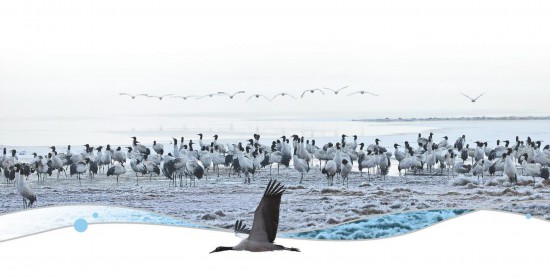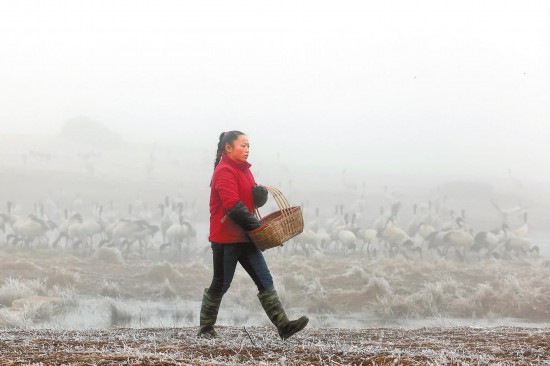




- BRNN
- BRI News
- BRNN News
- Database
Official Documents Polices and Regulations
Inter-government Documents International Cooperation BRI Countries
Business Guide Economic Data BRI Data
Trade
Investment Projects Latest projects
Cases - Content Pool

Photo shows black-necked cranes in the Yunnan Dashanbao National Nature Reserve for Black-necked Cranes located in Zhaotong city, southwest China's Yunnan Province. (Photo/Yunnan Daily)
After lunch, Chen Guanghui, a guardian for black-necked cranes in the Yunnan Dashanbao National Nature Reserve for Black-necked Cranes located in Zhaotong city, southwest China's Yunnan Province, was on a trek to feed the birds.
"My mother-in-law started feeding the cranes voluntarily in 1992, and I took over from her in 2003," Chen said, adding that the birds arrive like clockwork every year during the ninth month of the traditional Chinese lunar calendar, and leave during the third month of the following year.
The nature reserve is a crucial winter sanctuary for black-necked cranes, a species under first-class state protection in China. These rare cranes are selective about their habitat, requiring clear waters and undisturbed wetlands. Dashanbao provides excellent natural conditions for black-necked cranes to overwinter.

Chen Guanghui feeds black-necked cranes in the Yunnan Dashanbao National Nature Reserve for Black-necked Cranes located in Zhaotong city, southwest China's Yunnan Province. (Photo/Yunnan Daily)
"The government has attached great importance to protecting black-necked cranes in recent years. As a result, the population of black-necked cranes overwintering in Dashanbao increased from over 200 in 1990 to more than 2,000 today," said Chen.
Chen added that the nature reserve's growing reputation thanks to the bird species has attracted bird enthusiasts from far and wide, boosting local eco-tourism and raising awareness of protecting birds among residents.
In recent years, Zhaotong has implemented a comprehensive three-pronged approach to protect the cranes, including enforcing a dedicated protection regulation, establishing a compensation mechanism, and implementing a series of ecological projects. As part of this effort, the city launched a program to relocate some people from Dashanbao to gradually minimize the impact of human activities on black-necked cranes and other wildlife.
Since 2014, the nature reserve has undergone extensive habitat restoration, building 1.53 hectares of water purification pools, restoring 608.78 hectares of wetlands, and establishing 30 hectares of food source bases for the cranes.
The city has also leveraged modern technology to protect the cranes, with over 30 infrared cameras and a smart platform monitoring crane movement in real time. In 2022, the breeding success of black-necked cranes in Dashanbao jumped by 15 percent year on year, and the survival rate of young cranes exceeded 80 percent.
The rise in the populations of black-necked cranes and other wintering birds in the nature reserve is also attributable to the joint efforts reserve staff and local communities.

Tel:86-10-65363107, 86-10-65368220, 86-10-65363106